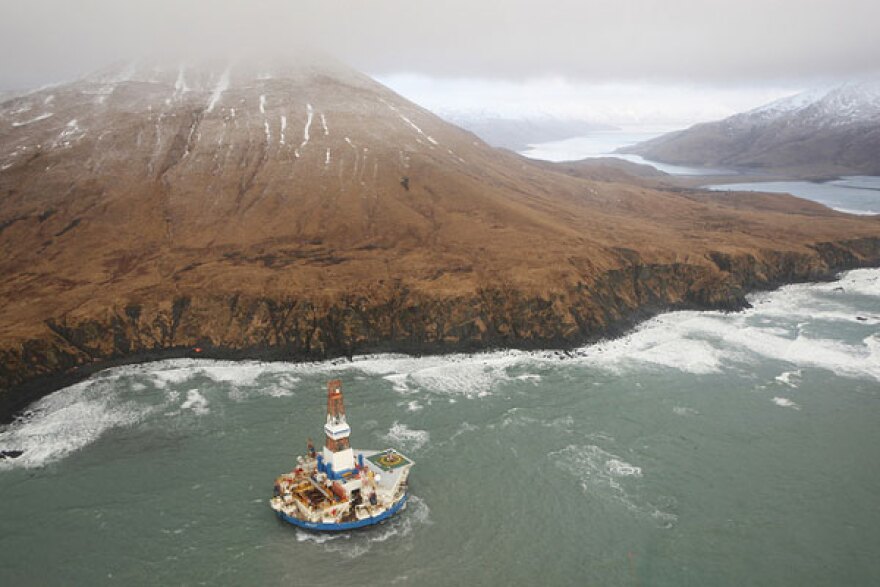The Coast Guard has released the results of an investigation into the grounding of Shell's Kulluk drill rig at the end of their troubled Arctic drilling season. The agency documented multiple safety violations. It also found a desire to avoid a state tax contributed to the decision to move the rig in poor conditions.
The agency found that Royal Dutch Shell and its subcontractor, Edison Chouest, severely underestimated the risk of towing an unpropelled oil rig through the Gulf of Alaska in a winter storm in December 2012.
The Kulluk had been moored at a custom-built dock in Dutch Harbor. According to the Coast Guard, Shell executives believed they could dodge a multimillion-dollar state tax bill if they moved the rig out of Alaska before the start of the new year.
Some mariners knew it would be a rough journey: In an email early in the trip, the master of the Aiviq tow vessel said a winter tow "guarantees an ass kicking."
As predicted, the fleet encountered rough seas. The tow line between the Kulluk and the vessels that were pulling it snapped repeatedly -- in part, due to inadequate equipment. After multiple attempts to recover the rig, the Kulluk crashed into a remote island on New Year's Eve 2012. It took days to recover the vessel.
The accident reportedly cost Shell more than $90 million. And it gave critics of Arctic oil exploration plenty of ammunition.
Michael LeVine is the Pacific senior counsel for Oceana.
"We need to fundamentally rethink the way we're balancing costs and benefits and the standards to which we're holding companies like Shell," LeVine says.
The Coast Guard uncovered multiple legal violations, including failures to report marine casualties and safety issues. The agency also discovered inadequate watch-keeping in the bridge and engine rooms of Shell's fleet.
LeVine says the federal government bears some blame, since they approved Shell's Arctic exploration plans.
"It is not sufficient simply for a company to say that they're prepared to operate in Alaska," LeVine says. "We all deserve to have these companies come here and show us that they actually appreciate the difficult and remoteness of operating in Alaska water, and the importance of those resources to all of us."
The Coast Guard is recommending measures to improve tow plans and correct engineering deficiencies on the Aiviq tug.
In a statement, Shell spokesperson Megan Baldino said the company is taking the Coast Guard's findings seriously.
"Already, we have implemented lessons learned from our internal review of our 2012 operations," Baldino said. "Those improvements will be measured against the findings in the USCG report as well asrecommendations from the US Department of Interior."


